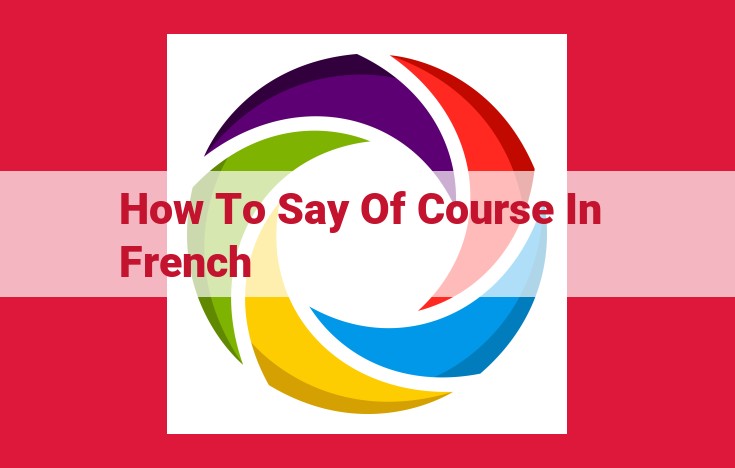To express “Of course” in French, commonly used phrases include “Bien sûr,” meaning “Of course,” and “Naturellement,” meaning “Naturally.” Other words or phrases that convey agreement are “Oui” (yes) or “Absolument” (absolutely). In French culture, expressions like “Bien sûr” reflect values of politeness and social harmony, where avoiding disagreement and affirming others is considered essential. Using these phrases appropriately demonstrates respect and understanding of cultural conventions.
Expressing Agreement in French: A Guide to Common Phrases and Expressions
Mastering the art of expressing agreement is crucial for navigating social interactions and building rapport in French. Beyond the familiar “Oui” (yes), there exists a wealth of phrases and expressions that convey a range of nuanced meanings. Embark on a linguistic journey as we delve into the French lexicon of agreement:
Bien sûr (Of course):
This versatile expression is the go-to choice for conveying unequivocal agreement. Its literal translation, “Well sure,” reflects the confidence and certainty of the speaker’s stance. Use it when you wholeheartedly agree with someone’s statement or proposal.
Naturellement (Naturally):
Slightly more formal than “Bien sûr,” “Naturellement” exudes a sense of elegance and refinement. It suggests that your agreement is based on inherent logic or reason. Employ it in situations where you want to convey your agreement in a sophisticated manner.
D’accord (Okay):
This informal phrase is commonly used among friends and peers. It indicates a casual agreement, often in response to a request or suggestion. Its simplicity makes it suitable for everyday conversations.
Je suis d’accord (I agree):
The direct translation of “I agree,” this phrase is straightforward and unambiguous. It leaves no room for uncertainty and is often used in formal settings or when emphasizing your stance.
Absolument (Absolutely):
When you want to emphasize your agreement in a strong and definitive manner, “Absolument” is the perfect choice. Its emphatic tone leaves no doubt about your unwavering support for the matter at hand.
Synonyms and Related Terms for Expressing Agreement in French
When you want to convey agreement or affirmation in French, you have several options beyond the classic “Bien sûr.” Here are some common synonyms and related terms:
Oui
Perhaps the most straightforward way to say “yes” in French is simply “oui.” While it may seem too basic to be a synonym for “Of course,” it can indeed carry the same weight. In casual situations, a simple “oui” can be just as affirming as “Bien sûr.”
Absolument
For a more emphatic agreement, you can use “absolument.” This translates to “absolutely” and conveys a strong sense of certainty. It’s perfect when you want to leave no doubt about your agreement.
Certainement
“Certainement” is another strong synonym for “Of course.” It means “certainly” and implies that you have no reservations about your agreement. It’s often used in more formal or polite settings.
D’accord
“D’accord” is a more informal way to say “OK” or “I agree.” It’s commonly used in daily conversations and is a simple yet effective way to indicate your consent.
Cultural Context: French Politeness and Social Conventions
In the tapestry of French culture, politeness and agreement are threads that intertwine seamlessly. The ubiquitous use of phrases and expressions that convey affirmation reflects the deep-rooted social values of harmony and respect.
French society places a premium on avoiding confrontation. Open disagreement is often seen as a breach of etiquette, and affirmations serve as a diplomatic way to express agreement without causing offense. The use of phrases like “Bien sûr” (“Of course”) and “Naturellement” (“Naturally”) signals a willingness to accommodate the other person’s perspective.
This cultural emphasis on agreement stems from a desire to maintain relationships and foster a sense of collective well-being. By expressing agreement, French speakers demonstrate their empathy and understanding of others’ viewpoints. This social glue helps to create a harmonious and cooperative society.
Moreover, the use of agreement phrases is a reflection of the French concept of politeness. In France, politeness is not simply a matter of good manners; it is an essential aspect of social interaction. By expressing agreement, individuals show that they respect the other person’s feelings and opinions, even if they do not fully share them. This display of consideration is highly valued in French culture, and it helps to create a positive and respectful environment for all.

